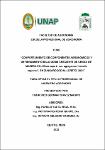Comportamiento de componentes agronómicos y de rendimiento bajo dosis creciente de ceniza de madera en Allium cepa L. var. agregatum “cebolla regional” en Zungarococha-Loreto. 2021
Abstract
The experiment "Behavior of agronomic and yield components under increasing dose of wood ash in Allium strain L. var. agregatum "regional onion", in Zungarococha- Loreto. 2021", was held at the facilities of the Workshop of Teaching and Research of Horticultural Plants (TEIPH), of the Faculty of Agronomy-UNAP, located at Km. 4 of the road to Zungarococha, south of the city of Iquitos.The type of research was experimental, explanatory with one independent variable (increasing dose of wood ash) and nine dependent variables (plant height, plant diameter, number of leaves/plant, leaf/plant weight, bulb diameter, total plant weight, number of bulbs/plant, weight of bulbs/plant and weight of bulbs/ha). The objective of the research work was to determine the behavior of the agronomic and yield components under increasing dose of wood ash in Allium strain L. var agregatum "regional onion", in Zungarococha-Loreto. 2021. The experimental design that was used was the Completely Random Block Design, with four treatments and four repetitions. Each experimental unit consisted of 4 rows, 10 plants/row and the sampling unit consisted of four plants/experimental unit. At the end of the experiment we had the following conclusions: Wood ash influences the behavior of agronomic components and crop yield of Allium strain L. var. agregatum "regional onion"; the T4 treatment (3 t of wood ash/ha), presented the best results of the behavior of the agronomic components and crop yield; the T4 Treatment (3 t of wood ash/ha), ranked first in bulb weight yield/ha with 10,200 Kg/ha and in the last place the T1 Treatment (0 t of wood ash), with 4,012.5 Kg/ha; the T4 Treatment (3 t of wood ash/ha), obtained the best economic performance, with a utility of S/.,27,545 .00. El experimento “Comportamiento de componentes agronómicos y de rendimiento bajo dosis creciente de ceniza de madera en Allium cepa L. var. agregatum “cebolla regional”, en Zungarococha-Loreto. 2021”, se realizó en las instalaciones del Taller de Enseñanza e Investigación de plantas Hortícolas (TEIPH), de la Facultad de Agronomía-UNAP, ubicada en el Km. 4 de la carretera a Zungarococha, al Sur de la ciudad de Iquitos. La investigación fue experimental, explicativo con una variable independiente (dosis creciente de ceniza de madera) y nueve variables dependientes (altura de planta, diámetro de planta, número de hojas/planta, peso de hojas/planta, diámetro de bulbo, peso total de la planta, numero de bulbos/planta, peso de bulbos/planta y peso de bulbos/ha). El Diseño experimental que se utilizó fue el Diseño de Bloques Completamente al Azar, con cuatro tratamientos y cuatro repeticiones. Cada unidad experimental estuvo constituida de 4 filas, 10 plantas/fila y la unidad de muestreo estuvo constituida por cuatro plantas/unidad experimental. Al final del experimento se tuvo las siguientes conclusiones: La ceniza de madera influye en el comportamiento de los componentes agronómicos y rendimiento del cultivo de Allium cepa L. var. agregatum “cebolla regional”; el tratamiento T4 (3 t de ceniza de madera/ha), presentó los mejores resultados del comportamiento de los componentes agronómicos y rendimiento del cultivo; el Tratamiento T4 (3 t de ceniza de madera/ha), ocupó el primer lugar de rendimiento de peso de bulbos/ha con 10,200 Kg/ha y en el último lugar el Tratamiento T1 (0 t de ceniza de madera), con 4,012.5 Kg/ha; el Tratamiento T4 (3 t de ceniza de madera/ha), obtuvo el mejor rendimiento económico, con una utilidad de S/.,27,545.00.
Collections
- Tesis [675]


